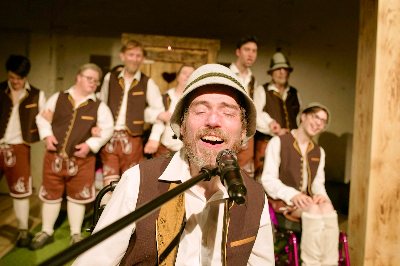
© https://www.nachtkritik.de/
У театрі RambaZamba в Берліні відбулася прем’єра оновленого шоу-ревю «Musikantenstadl» — сатиричної реконструкції культової телепрограми 1980-х, яка в минулому асоціювалась із провінційною, ідеалізованою уявою про «душу німецької нації». Режисер, музикант і сатирик Райнальд Гребе (Rainald Grebe) разом з інклюзивною трупою театру створив проєкт, що балансує між карнавалом і критикою, між сентиментом і глибоким соціальним коментарем. Grebe — відомий у Німеччині завдяки своїм експериментам на межі кабаре, театру та поп-культури. Його особливий почерк — поєднання іронії з автентичністю, історичної пам’яті з сучасною критикою. У новій виставі він не лише деконструює образ "ідеальної Німеччини", але й залучає до гри акторів з інвалідністю — учасників театру RambaZamba, що вже понад 30 років є флагманом інклюзивного сценічного мистецтва в Європі. Сцена переповнена символами: альпійське тло, дерев’яні лави, дирндлі та шкіряні шорти, йодль і баварський гламур. Але цей "ярмарок" поступово розкладається на фрагменти — з’являються гіркі пісні, гендерна критика, іронія над «ностальгією за Heimat», а також сюжети про мігрантський досвід. Пісні, які ще недавно здавалися нешкідливо розважальними, виявляються носіями застарілих, а іноді небезпечних ідеологем. Критики називають виставу «сумішшю трешу та прозріння», «святом з підтекстом» і відзначають її легкість, з якою порушуються складні теми. Прем’єра одразу привернула увагу театральної публіки, адже зачіпає актуальні теми: ідентичність, відчуття дому, ставлення до "інакших" у німецькому суспільстві. Особливого резонансу вистава набула через поєднання сатири та участі людей з інвалідністю, що кидає виклик уявленням про «норму» у мистецтві.
Підтримати видання або поширення саме цієї cтатті (вказати): номер корпоративної картки VISA 4874 24 25 0032 3434
Musikantenstadl Revue in Berlin Reimagines German Folk Culture and Confronts Rising Populism
The RambaZamba Theatre in Berlin has premiered a bold reinvention of Musikantenstadl — a satirical reconstruction of the cult 1980s television variety show once synonymous with an idyllic, provincial image of the German national soul. Directed by musician and satirist Rainald Grebe, the production fuses cabaret, nostalgia, and sharp social commentary in a format that is equal parts carnival and critique.Grebe, known in Germany for his boundary-pushing projects at the crossroads of theatre, cabaret, and pop culture, brings his signature style — a mix of irony and sincerity, historical memory and modern scrutiny — to this reimagined folk spectacle. At the heart of the production is RambaZamba’s inclusive ensemble, which features performers with disabilities and has long been a trailblazer in European inclusive theatre. The stage is rich in symbolism: alpine backdrops, wooden benches, dirndls, leather shorts, yodelling and Bavarian kitsch. But this nostalgic spectacle slowly unravels. Songs once dismissed as harmless entertainment are exposed as carriers of outdated — at times disturbing — ideologies. Gender tropes are questioned, migrant stories woven in, and the much-romanticised notion of Heimat is subtly dismantled. Critics have praised the production as "a delirious blend of trash and truth," and "a summer romp with unsettling depths." What might begin as affectionate parody soon pivots into biting political reflection. Particularly striking is the way satire and inclusivity converge: the presence of disabled performers not only disrupts the expectations of a traditional folk revue, but also challenges broader assumptions about ‘normality’ in art and society. Grebe’s Musikantenstadl arrives at a time when German cultural identity is once again being politicised. In this context, the show’s revival of a once-conservative entertainment format becomes an act of reclamation — using camp and critique to wrestle national nostalgia away from rising populist forces.
99